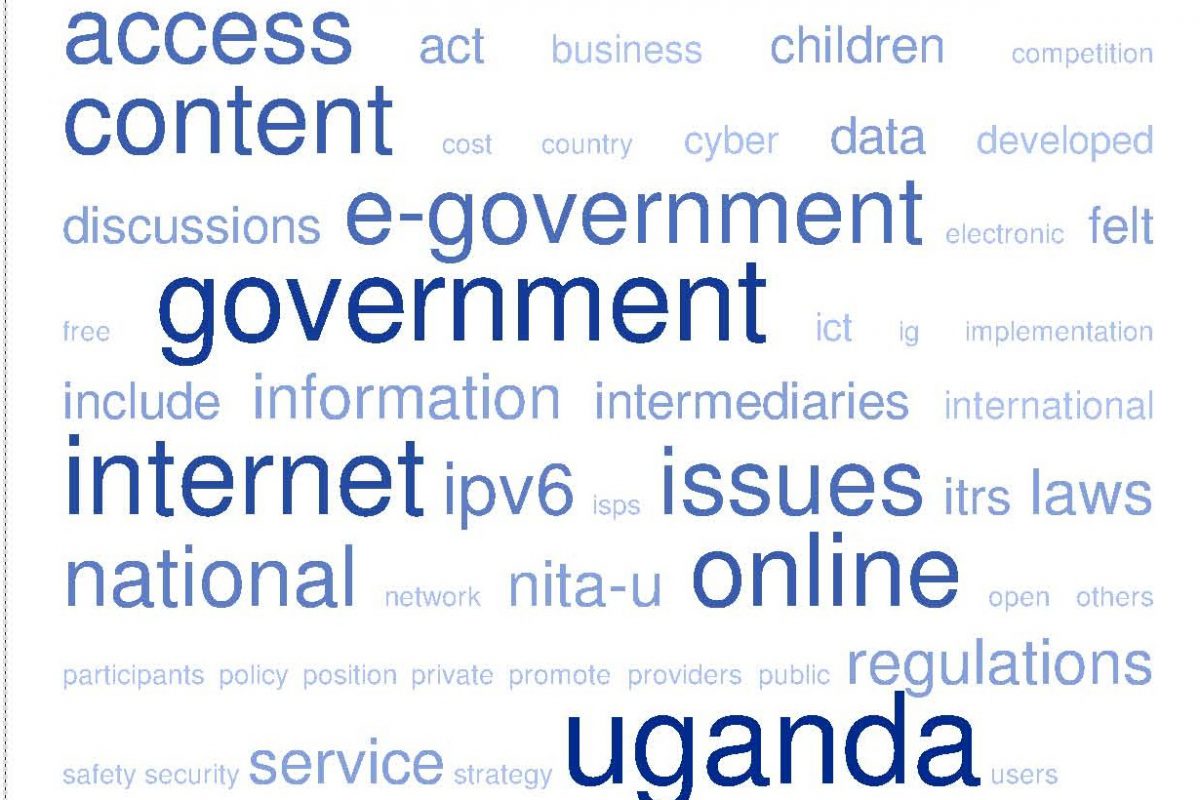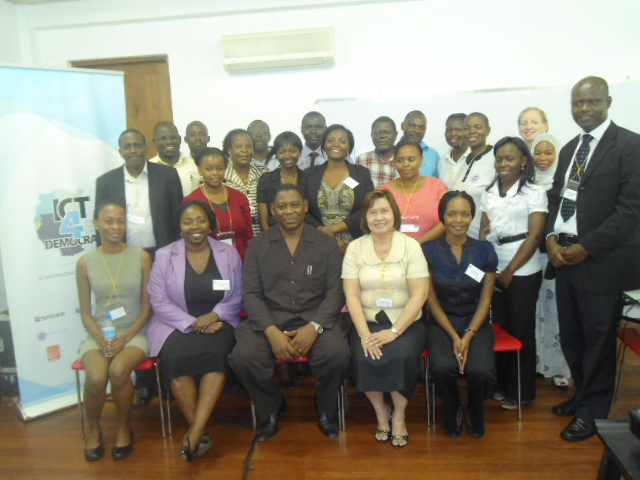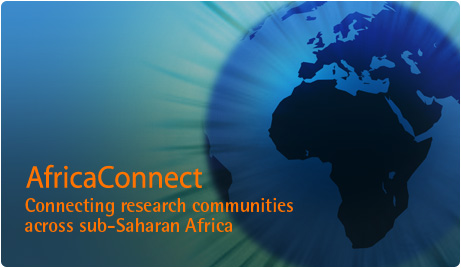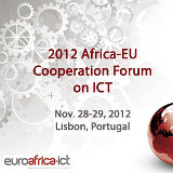 The report of the 5th Uganda Internet Governance Forum organised by the Collaboration on International ICT Policy for East and Southern Africa (CIPESA) in conjuction with the Uganda National Information Technology Authority – Uganda (NITA-U) and the Internet Society Chapter Uganda is available for download here.
The report of the 5th Uganda Internet Governance Forum organised by the Collaboration on International ICT Policy for East and Southern Africa (CIPESA) in conjuction with the Uganda National Information Technology Authority – Uganda (NITA-U) and the Internet Society Chapter Uganda is available for download here.
ICT4Democracy in East AFrica Workshop in Dar es Salaam
 The ICT4Democracy East Africa Network – of which CIPESA is a member – is currently holding a two day workshop in Dar es Salaam, Tanzania. This workshop aims to promote the Network’s activities with partners showcasing the progress of their work to improve democratisation in the region.
The ICT4Democracy East Africa Network – of which CIPESA is a member – is currently holding a two day workshop in Dar es Salaam, Tanzania. This workshop aims to promote the Network’s activities with partners showcasing the progress of their work to improve democratisation in the region.
The event was officially opened by Eng. Dr. Zaipuna Yonah, the Director of ICT, Ministry of Science and Technology in Tanzania. In his opening address, Eng. Dr. Zaipuna thanked the government of Sweden through (SPIDER) The Swedish Program for ICT in Developing Regions and SIDA (Swedish International Development Cooperation Agency) for supporting the development of ICTs in the developing world and indicated that the work of the ICT4Democracy in East Africa network is already impacting the lives of citizens living in the region.
Eng. Dr. Zaipuna also highlighted the work the Tanzanian government was doing in developing ICT infrastructure within the country and extending it to neighbouring countries. He urged the members of the network to continue sharing the progress of their initiatives saying that “Accountability should not only be in what we read and write, democracy is more about translating the intentions into realities.”
To view the complete photo gallery of the ongoing workshop visit this link.
The presentations from the workshop will be uploaded at www.ict4democracy.org
Launch of AfricaConnect, the Regional Connectivity Ramp-up Initiative
 The 2012 Africa-Euro Cooperation Forum on ICT saw the European launch of AfricaConnect, a high-capacity internet network for academic and scientific collaboration for sub-Saharan Africa.
The 2012 Africa-Euro Cooperation Forum on ICT saw the European launch of AfricaConnect, a high-capacity internet network for academic and scientific collaboration for sub-Saharan Africa.
The AfricaConnect project has seen the establishment of UbuntuNet, a high-capacity regional data network for academic and scientific collaboration in East and Southern Africa, and improved the volume and reliability of connectivity within the region and to the global research and education community.
The specific fields of research activities for the network are Health, Bio-Medical Sciences, Climate, Agriculture, Education and Environment.
Launched in Africa two weeks ago on November 15 at the UbuntuNet 2012 conference held in Dar es Salaam, Tanzania, the network connects the Democratic Republic of Congo, Ethiopia, Kenya, Malawi, Mozambique, Namibia, Rwanda, Somalia, Sudan, South Africa, Tanzania, Uganda and Zambia. It also connects African and European partners via GÉANT, the pan-European (Germany, Italy, Portugal, Ireland and Netherlands) research and education network.
Speaking at the launch, Dr. Francis Tusubira, CEO of the UbuntuNet Alliance, stated that the network is not only intended to help science, but “change lives”.
“We can not forget that this is not only about networks. It is about people and the change we can bring to communities,” said Dr. Tusubira.
He added that borrowing from the meaning of the word Ubuntu, the project is centred around mutual responsibility in community welfare and people committing to change to “remove the isolation of researchers in Africa.”
AfricaConnect is intended to enable researchers and academics in Africa to collaborate seamlessly with each other and with research and education institutions around the world. The network supports data-intensive and time critical applications, provides fast access to web-based resources enabling research centres and universities across the region to participate in joint projects.
The project is funded by the European Commission and African partners in collaboration with DANTE (Delivery of Advanced Network Technology to Europe) and the Ubuntu Alliance.
Further information is available at www.africaconnect.eu
The 2012 Africa-EU Cooperation Forum on ICT Opens
 The 2012 Africa-EU Cooperation Forum on ICT opened today, Wednesday November 28, 2012 in Lisbon, Portugal. Under the theme Teaming-up for a strengthened and coordinated approach to foster Euro-African innovative cooperation on ICT, the two day forum will bring together European and African stakeholders in the public and private sectors involved in collaborative ICT research and ICT for development to share knowledge and experiences. Furthermore, discuss policy related issues.
The 2012 Africa-EU Cooperation Forum on ICT opened today, Wednesday November 28, 2012 in Lisbon, Portugal. Under the theme Teaming-up for a strengthened and coordinated approach to foster Euro-African innovative cooperation on ICT, the two day forum will bring together European and African stakeholders in the public and private sectors involved in collaborative ICT research and ICT for development to share knowledge and experiences. Furthermore, discuss policy related issues.
The ICT4Democracy in East Africa Network – of which CIPESA is a member – is participating in the forum under the eGovernment & eDemocracy track.
Session chair: Angela Crandall, iHub Research
Panellist: Ashnah Kalemera, CIPESA
The objectives of this session are to understand the different eGovernment/ eDemocracy initiatives being undertaken, discuss the progress being made in governance through the use of mobile tools, and identify the challenges that need to be overcome in order to scale and sustain eDemocracy/ eGovernment initiatives.
The 5th in its series, the event is organised by the EuroAfrica-ICT initiative under the aegis of the European and the African Unions Commissions.
Read more about the forum here.
CIPESA at the Internet Governance Forum 2012
The annual Internet Governance Forum (IGF) today opened in Baku, Azerbaijan. Taking place from November 6-9 2012, the main theme of this year’s meeting is Internet Governance for Sustainable Human Economic and Social Development.
An initiative of the United Nations, the IGF is a multi-stakeholder dialogue forum open to representatives from Government, NGOs, academia, private sector, as well as any other entities and individuals interested in Internet Governance issues.
CIPESA is participating in the forum with speakers in main sessions:
WS 187 Society before and after the Internet and digital media – Ashnah Kalemera (panelist)
WS 91 Technology, economic and societal opportunities and women – Lillian Nalwoga (panelist)
Furthermore, CIPESA is also participating in events organised by the Association for Progressive Communications (APC), of which it is a member. Read more about APC’s participation at the IGF here.
Read more about the IGF here.





